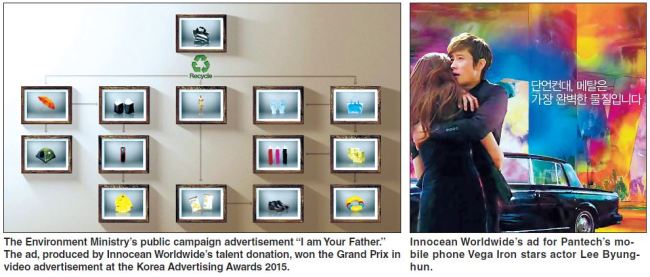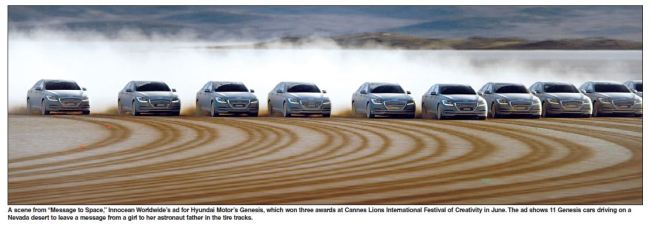[Weekender] Adding a human touch to commercial imagination
By Korea HeraldPublished : Nov. 27, 2015 - 20:00

When a government institution or ministry airs an advertisement, the point is to convey a message of public interest ― usually on a tight budget and under numerous regulatory restrictions. No wonder that these “public” ads mostly fail to appeal to the public.
But this year, a video campaign on the importance of recycling overturned such prejudice. Earlier this month, Korea Advertising Awards 2015 selected the Environment Ministry’s public advertisement “I Am Your Father” as the best overall video advertisement, public or private.
The piece, which humorously describes how something can be recreated into useful items, beat over 300 rival entries, including some of this year’s most popular commercial ads. It also relieved the ministry from cliched images of trees, water, children and so forth.
This innovation ― indeed, as it was the first time ever that a government ministry was offered the best ad award ― was the result of talent donation by an advertising agency, Innocean Worldwide.
“The ad went viral as soon as it was uploaded, without much PR effort,” Kwon Kyoung-dae, senior account manager and leader of the campaign team, told The Korea Herald.
Of course, the level of popularity on the Internet does not directly indicate the quality of the ad, nor does it guarantee commercial success, he admitted.
“But the real innovation in this ad was that it wiped out the conventional prejudice against public ads and remodeled the core message in a fun, sophisticated way,” Kwon said.
“The point is quite simple ― viewers always sympathize with an attractive and valuable advertisement and voluntarily share it with friends.”
The given advertisement pictures the recycling dynamics of waste materials turning into new objects as a “father-child” relationship, taking off after the famed scene in the classic Star Wars movie.

Such a parody is not the kind of expression that one might expect from a government department, and the ministry admits it.
“The original budget would have been about 200 million won ($174,825) but thanks to Innocean’s talent donation, we have managed to lower the amount to 36 million won,” said Vice Minister Jeong Yeon-man.
“Given their huge contribution, we gave the company full powers regarding the ad, from planning and coordination to actual production.”
Innocean, a combination of the words “innovation” and “ocean,” is South Korea’s second-largest advertising agency and an affiliate of Hyundai Motor Group. In partnership with its key clients Hyundai Motor and Kia Motors, the company has successfully launched a series of automobile ads in the United States over past years.
They include “A Message To Space,” a triple award winner at the Cannes Lions International Festival of Creativity 2015. The ad shows 11 units of Genesis, Hyundai Motor’s premium sedan model, marking on a Nevada desert a tire track image of a message from a girl to her astronaut father.
“The starting point and keyword of this ad was about connecting; connecting one space to another, one person to another,” Ahn Eun-jung, account director of the campaign team.
The story of a girl who wanted to deliver a message of love to her father who works at an international space station was the most dramatic way to picture such a connection, according to the ad director.
“So far, auto advertisements have mostly focused on the appearance and functions of cars, but through this innovation, we chose to influence consumers in a different way, by moving their emotions.”
It was not the first time that the agency attracted the market’s attention with car ads. Earlier this year, it also won The One Show’s Automobile Advertising of the Year Award 2015 for its ad for Genesis, “Dad’s Sixth Sense.”
The key idea that penetrates through all of Innocean’s productions, according to Kwon, is love for humanity.
“There is no doubt that information technology is a crucial tool and channel in the world of advertising,” Kwon said.
‘But ironically, the more technology advances, the more the public craves for emotional approaches, which is why our representative ads describe human relationships and emotions.”
By Bae Hyun-jung (tellme@heradcorp.com)
-
Articles by Korea Herald







![[Graphic News] More Koreans say they plan long-distance trips this year](http://res.heraldm.com/phpwas/restmb_idxmake.php?idx=644&simg=/content/image/2024/04/17/20240417050828_0.gif&u=)
![[KH Explains] Hyundai's full hybrid edge to pay off amid slow transition to pure EVs](http://res.heraldm.com/phpwas/restmb_idxmake.php?idx=644&simg=/content/image/2024/04/18/20240418050645_0.jpg&u=20240419100350)






![[From the Scene] Monks, Buddhists hail return of remains of Buddhas](http://res.heraldm.com/phpwas/restmb_idxmake.php?idx=652&simg=/content/image/2024/04/19/20240419050617_0.jpg&u=20240419175937)

![[KH Explains] Hyundai's full hybrid edge to pay off amid slow transition to pure EVs](http://res.heraldm.com/phpwas/restmb_idxmake.php?idx=652&simg=/content/image/2024/04/18/20240418050645_0.jpg&u=20240419100350)

![[Today’s K-pop] Illit drops debut single remix](http://res.heraldm.com/phpwas/restmb_idxmake.php?idx=642&simg=/content/image/2024/04/19/20240419050612_0.jpg&u=)